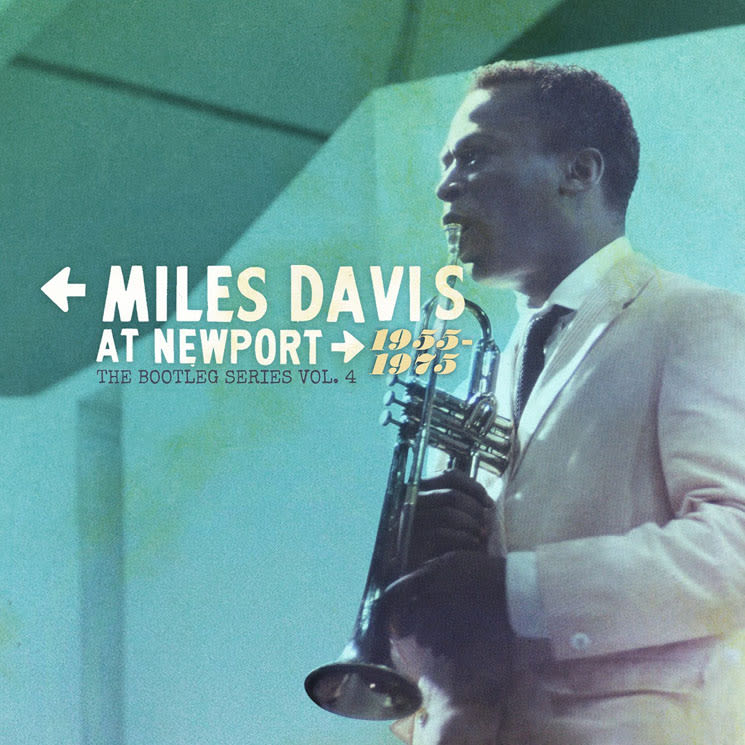Given that nearly a quarter of the music on Miles Davis At Newport has been previously released, one might suspect that Columbia/Legacy are simply recycling the continuingly lucrative catalogue of Miles Davis. After the essential multi-disc box sets of quintessential Davis albums like In A Silent Way, Bitches Brew, A Tribute To Jack Johnson and On The Corner, not to mention the previous three instalments of The Bootleg Series, it might be safe to assume that the buried treasures in the Prince Of Darkness's vault had all been uncovered.
It's a happy surprise, then, that the four discs that comprise Miles Davis At Newport are just as revelatory a supplement as Davis's studio-recorded career watersheds. The first disc documents Davis's first appearance at the venerable festival in July 1955, plus a wonderful 1958 performance by Davis's legendary sextet (featuring John Coltrane and Bill Evans) shortly before recording the landmark Kind Of Blue, while the second disc's chronologically sequenced sets from (1966 and 1967) with the trumpeter's second great quintet (featuring Wayne Shorter, Herbie Hancock and Tony Williams) are crucial snapshots of Davis's ever-evolving aesthetic.
The genesis of his fusion inclinations can be heard on the more vigorous 1967 set. Turbo-charged selections from Bitches Brew (dating from 1969 and 1971) put a more raucous stamp on that iconoclastic masterpiece, yet the undisputed high point of this collection is a 1973 performance from the Davis band that would record the double-live opus Dark Magus on the third disc. Newport Festival founder George Wein's assertion to Ashley Kahn in the set's comprehensive liner essay that "Davis couldn't play as well and was covering up with electronics" is indicative of the politics surrounding this still-controversial period in Davis's career, but fast-forward 42 years to "post-jazz" adventurers like Flying Lotus who continue to push the music, and its movement in increasingly modernist, genre-blurring directions, and The Dark Magus band sound not only innovative but prophetic.
Plus, the collective plays like a motherfucker: bassist Michael Henderson and drummer Al Foster lay down funk-laden African syncopation, textured by guitarists Pete Cosey and Reggie Lucas with Davis's wah-wah enhanced trumpet. This is loud and proud , mesmerizing, uncut groove, and over the 47-minute-plus performance, it becomes apparent that Davis wasn't covering up anything, nor relying on electronics or funk and rock influences anymore than he relied on Coltrane or Hancock in the past.
Rather, he was pushing the music forward to its cosmic limit, and frankly, any sound so initially divisive and so subsequently influential are deserving of a serious listen. This is essential.
(Columbia/Legacy)It's a happy surprise, then, that the four discs that comprise Miles Davis At Newport are just as revelatory a supplement as Davis's studio-recorded career watersheds. The first disc documents Davis's first appearance at the venerable festival in July 1955, plus a wonderful 1958 performance by Davis's legendary sextet (featuring John Coltrane and Bill Evans) shortly before recording the landmark Kind Of Blue, while the second disc's chronologically sequenced sets from (1966 and 1967) with the trumpeter's second great quintet (featuring Wayne Shorter, Herbie Hancock and Tony Williams) are crucial snapshots of Davis's ever-evolving aesthetic.
The genesis of his fusion inclinations can be heard on the more vigorous 1967 set. Turbo-charged selections from Bitches Brew (dating from 1969 and 1971) put a more raucous stamp on that iconoclastic masterpiece, yet the undisputed high point of this collection is a 1973 performance from the Davis band that would record the double-live opus Dark Magus on the third disc. Newport Festival founder George Wein's assertion to Ashley Kahn in the set's comprehensive liner essay that "Davis couldn't play as well and was covering up with electronics" is indicative of the politics surrounding this still-controversial period in Davis's career, but fast-forward 42 years to "post-jazz" adventurers like Flying Lotus who continue to push the music, and its movement in increasingly modernist, genre-blurring directions, and The Dark Magus band sound not only innovative but prophetic.
Plus, the collective plays like a motherfucker: bassist Michael Henderson and drummer Al Foster lay down funk-laden African syncopation, textured by guitarists Pete Cosey and Reggie Lucas with Davis's wah-wah enhanced trumpet. This is loud and proud , mesmerizing, uncut groove, and over the 47-minute-plus performance, it becomes apparent that Davis wasn't covering up anything, nor relying on electronics or funk and rock influences anymore than he relied on Coltrane or Hancock in the past.
Rather, he was pushing the music forward to its cosmic limit, and frankly, any sound so initially divisive and so subsequently influential are deserving of a serious listen. This is essential.
